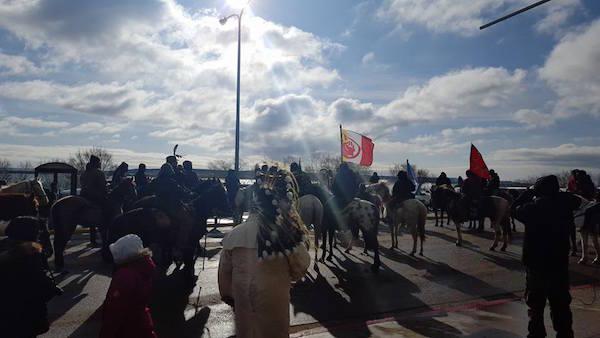
by Deep Green Resistance News Service | Apr 10, 2016 | Indigenous Autonomy, Obstruction & Occupation
Featured image: The spirit riders at Standing Rock show support for keeping the Missouri River waters clean. Image by Steve Sitting Bear.
By Chelsey Luger / Indian Country Today Media Network
In the coming weeks or maybe even days, the U.S. Army Corps of Engineers will issue a decision as to whether or not they will allow the Dakota Access Pipeline, also known as the Bakken Pipeline, to be constructed.
Until then, citizens and allies of the Oceti Sakowin (Seven Council Fires of the Great Sioux Nation) will continue to protest the pipeline, urging stakeholders to recognize the devastation that would ensue should the pipeline be built.
“The DAPL poses a threat to our people, cultural and historically significant areas,” said Paula Antonie, Chair of Shielding the People and a Rosebud Sioux tribal citizen. “We will stand by our Hunkpapa relatives in defending against any major environmental, public health and safety hazards within our treaty territory.”
The proposed pipeline would stretch for thousands miles across four states beginning in western North Dakota and ending in Indiana. It would cross the Missouri River mere feet away from the northern border of the Standing Rock Reservation, threatening to contaminate and destroy the waters.
“When this proposed pipeline breaks, as the vast majority of pipelines do, over half of the drinking water in South Dakota will be affected,” said Joye Braun, a community organizer from the Cheyenne River reservation. “How can rubber-stamping this project be good for the people, agriculture and livestock? It must be stopped.”
While the oil industry would like the public to believe that pipelines are a clean and efficient way of transporting oil with little risk, the data suggest otherwise. According to the Associated Press, there were 300 oil pipeline breaks in North Dakota alone during 2012–2013, and none of them were reported to the public. North Dakota is the second-largest oil-producing state after Texas.
Delegates from the Standing Rock Sioux Tribe have already met with representatives from several federal agencies, including the Army Corps, urging them to reevaluate the environmental impact of the project. The interests of the Standing Rock Sioux were not taken into consideration in the initial environmental assessment. While the Corps decision will have an influence, it won’t be the end of the fight.
“The Corps will get sued either way,” explained Standing Rock Chairman Dave Archambault. “If they approve of the pipeline, the Standing Rock Sioux Tribe will sue them. If they reject it, Energy Transfer Partners will sue them.”
Archambault explained that unlike Keystone XL, which President Obama rejected last November, an executive order will not hold the same weight in this project. While Keystone XL was a federal project crossing the U.S.–Canada border, Dakota Access is a private project and does not cross an international boundary. In addition, most of the landowners along the way have already issued voluntary easements on their property.
Meanwhile, several grassroots groups, tribal citizens, and concerned allies who oppose the pipeline have banded together to work on getting their message out. This conglomerate of activists are calling themselves “Chante tin’sa kinanzi Po” or “People, Stand with a Strong Heart!” Their mission statement says this:
“ ‘They claim this mother of ours, the Earth, for their own use, and fence their neighbors away from her, and deface her with their buildings and their refuse.’ —Chief Sitting Bull. His way of life is our way of life—standing in opposition to the Dakota Access Pipeline is our duty.”
On April 1, Chante tin’sa kinanzi Po set up a horse ride to celebrate the founding of a Spirit Camp that they erected along the route of the proposed pipeline near the community of Cannon Ball in North Dakota.
The camp is called Inyan Wakhanagapi Othi or Sacred Rock, which translates as the original name of the Cannon Ball area.
Dozens of riders and supporters joined in the spirit ride. All are welcome to show support at the campsite, which will be active for an undetermined period of time, or until no longer necessary. They urge all supporters to write letters to the Corps on behalf of tribal interests.
“We do not need oil to live, but we do need water,” said Waniya Locke, a descendant of the Standing Rock nation. “And water is a human right, not a privilege.”

by Deep Green Resistance News Service | Mar 9, 2016 | Indigenous Autonomy, Protests & Symbolic Acts
By WECAN International
SAN FRANCISCO, Calif., March 9, 2016 – In recognition of International Women’s Day, Indigenous Amazonian women leaders of seven nationalities including: Andoa, Achuar, Kichwa, Shuar, Shiwiar, Sapara and Waorani nationalities and their international allies took action in Puyo, Ecuador, in a forum and march in defense of the Amazon, Mother Earth and for climate justice. Specifically, they came together to denounce a newly signed oil contract between the Ecuadorian government and Chinese oil corporation Andes Petroleum.
By plane, foot, canoe, and bus, some five hundred women mobilized from deep in their rainforest territories and nearby provinces marching through the streets of the Amazon jungle town of Puyo.
Chanting, “Defend the forest, don’t sell it!” and carrying signs reading “No more persecution against women defenders of Mother Earth,” the march culminated in a rally in which each nationality denounced the new oil threat and shared traditional songs and ceremonies. The women spoke of other methods for protecting and defending the Amazon and its vital living systems, making it known that the women of the Amazon are not just victims of environmental and cultural genocide, but rather are vital solution bearers.
In addition to highlighting the grave social and ecologic implications of this new contract and the Ecuadorian government’s plans to tender several more oil blocks in the pristine, roadless southern Amazon, the women and allies brought light to their struggles and the ongoing criminalization faced as they stand to protect and defend their territories and lifeways based upon living in harmony with the natural world. A tribute was held in honor of Berta Caceres, the Honduran indigenous environmental leader who was killed last week for her years of work defending rights and territories from privatization, plantations, and most recently, a mega dam project.
The women of the Amazon were also joined by Casey Camp Horinek, WECAN delegation member and Indigenous leader of the Ponca Nation of Oklahoma, who shared her traditional songs and stories of how her people have been impacted by fracking activity.
“Right now the oil company is trying to enter our territory. That is our homeland, this is where we have our chakras (gardens), where we feed our families. We are warriors, and we are not afraid. We will never negotiate,” explained Rosalia Ruiz, a Sapara leader from the community of Torimbo, which is inside the Block 83 oil concession.
“Although we are from three different provinces, we are one territory and one voice,” Alicia Cahuiya, Waorani leader declared.
As the march unfolded, the Ecuadorian government and Andes Petroleum held a meeting in the nearby town of Shell to organize an illegal entry into Sapara territory, knowing that key leaders would not be present. Outraged, a delegation of Sapara delivered a letter to the meeting, underscoring their peoples’ opposition to the oil project and governments tactics to divide the community. They successfully thwarted the government and company plans, and returned to the streets, victorious.
International allies including the Women’s Earth and Climate Action Network, Amazon Watch and Pachamama Alliance shared messages of solidarity and calls for immediate action to keep fossil fuels in the ground in the Amazon.
“On this International Women’s Day we are reaching across borders and standing together as global women for climate justice to denounce oil extraction in the Amazon and call for attention to the struggles and solutions of local women land defenders,” explained Osprey Orielle Lake, Executive Director of the Women’s Earth and Climate Action Network, “We all depend on the flourishing of these precious rainforests, the lungs of the planet. Now is the time to keep the oil in the ground and stand with the women who have been putting their bodies on the line for years to protect the forest, their cultures, and the health and well being of all future generations.”
“Today was a historic day for indigenous Amazonian women! It was the first time that hundreds of women and their allies marched for the Amazon, Mother Earth and Climate Justice. And the power of women was so strong that plans for oil companies entering Sápara territory today were halted. This is is a signal that the collective call to defend rights and territories by keeping fossil fuels in the ground is working,” says Leila Salazar-López, Executive Director of Amazon Watch.
Belen Paez from Pachamama Alliance declared: “It’s a unique and historical moment to have the experience of solidarity and connection between indigenous women and activists from all over the world standing up for the rights of the Amazon rainforest and its people, we have all been waiting for this moment for so long, and that moment is now.”
The March 8 forum, action and press conference will be followed by a March 9 event and report back, ‘Women of Ecuadorian Amazon and International Allies Stand For Protection of the Amazon Rainforest’ to be held on March 9 at 17:00 at the Biblioteca FLASCO, Universidad FLACSO, Quito.
A solidarity action was also held at the Chinese consulate in San Francisco, CA, to denounce the new oil contracts on Sapara and Kichwa territory and support women’s rights in Ecuador and around the world.
-# # #-
About The Women’s Earth & Climate Action Network (WECAN International)
www.wecaninternational.org
@WECAN_INTL
The Women’s Earth and Climate Action Network (WECAN International) is a solutions-based, multi-faceted effort established to engage women worldwide as powerful stakeholders in climate change, climate justice, and sustainability solutions. Recent work includes the International Women’s Earth and Climate Summit, Women’s Climate Declaration, and WECAN Women’s Climate Action Agenda. International climate advocacy is complemented with on-the-ground programs such as the Women’s for Forests and Fossil Fuel/Mining/Mega Dam Resistance, US Women’s Climate Justice Initiative, and Regional Climate Solutions Trainings in the Middle East North Africa region, Latin America, and Democratic Republic of Congo. WECAN International was founded in 2013 as a project of the 501(c)3 Women’s Earth and Climate Caucus (WECC) organization and its partner eraGlobal Alliance.

by Deep Green Resistance News Service | Feb 11, 2016 | Colonialism & Conquest, Toxification
Featured image: Figure from EPA Pacific Southwest Region 9 Addressing Uranium Contamination on the Navajo Nation
By Courtney Parker / Intercontinental Cry
Recent media coverage and spiraling public outrage over the water crisis in Flint, Michigan has completely eclipsed the ongoing environmental justice struggles of the Navajo. Even worse, the media continues to frame the situation in Flint as some sort of isolated incident. It is not. Rather, it is symptomatic of a much wider and deeper problem of environmental racism in the United States.
The history of uranium mining on Navajo (Diné) land is forever intertwined with the history of the military industrial complex. In 2002, the American Journal of Public Health ran an article entitled, “The History of Uranium Mining and the Navajo People.” Head investigators for the piece, Brugge and Gobel, framed the issue as a “tradeoff between national security and the environmental health of workers and communities.” The national history of mining for uranium ore originated in the late 1940’s when the United States decided that it was time to cut away its dependence on imported uranium. Over the next 40 years, some 4 million tons of uranium ore would be extracted from the Navajo’s territory, most of it fueling the Cold War nuclear arms race.
Situated by colonialist policies on the very margins of U.S. society, the Navajo didn’t have much choice but to seek work in the mines that started to appear following the discovery of uranium deposits on their territory. Over the years, more than 1300 uranium mines were established. When the Cold War came to an end, the mines were abandoned; but the Navajo’s struggle had just begun.
Back then, few Navajo spoke enough English to be informed about the inherent dangers of uranium exposure. The book Memories Come to Us in the Rain and the Wind: Oral Histories and Photographs of Navajo Uranium Miners and Their Families explains how the Navajo had no word for “radiation” and were cut off from more general public knowledge through language and educational barriers, and geography.
The Navajo began receiving federal health care during their confinement at Bosque Redondo in 1863. The Treaty of 1868 between the Navajos and the U.S. government was made in the good faith that the government – more specifically, the Bureau of Indian Affairs (BIA) – would take some responsibility in protecting the health of the Navajo nation. Instead, as noted in “White Man’s Medicine: The Navajo and Government Doctors, 1863-1955,” those pioneering the spirit of western medicine spent more time displacing traditional Navajo healers and knowledge banks, and much less time protecting Navajo public health. This obtuse, and ultimately short-sighted, attitude of disrespect towards Navajo healers began to shift in the late 1930’s; yet significant damage had already been done.
Founding director of the environmental cancer section of the National Cancer Institute (NCI), Wilhelm C. Hueper, published a report in 1942 that tied radon gas exposure to higher incidence rates of lung cancer. He was careful to eliminate other occupational variables (like exposure to other toxins on the job) and potentially confounding, non-occupational variables (like smoking). After the Atomic Energy Commission (AEC) was made aware of his findings, Hueper was prohibited from speaking in public about his research; and he was reportedly even barred from traveling west of the Mississippi – lest he leak any information to at-risk populations like the Navajo.
In 1950, the U.S. Public Health Service (USPHS) began to study the relationship between the toxins from uranium mining and lung cancer; however, they failed to properly disseminate their findings to the Navajo population. They also failed to properly acquire informed consent from the Navajos involved in the studies, which would have required informing them of previously identified and/or suspected health risks associated with working in or living near the mines. In 1955, the federal responsibility and role in Navajo healthcare was transferred from the BIA to the USPHS.
In the 1960’s, as the incidence rates of lung cancer began to climb, Navajos began to organize. A group of Navajo widows gathered together to discuss the deaths of their miner husbands; this grew into a movement steeped in science and politics that eventually brought about the Radiation Exposure Compensation Act (RECA) in 1999.
Cut to the present day. According to the US EPA, more than 500 of the existing 1300 abandoned uranium mines (AUM) on Navajo lands exhibit elevated levels of radiation.
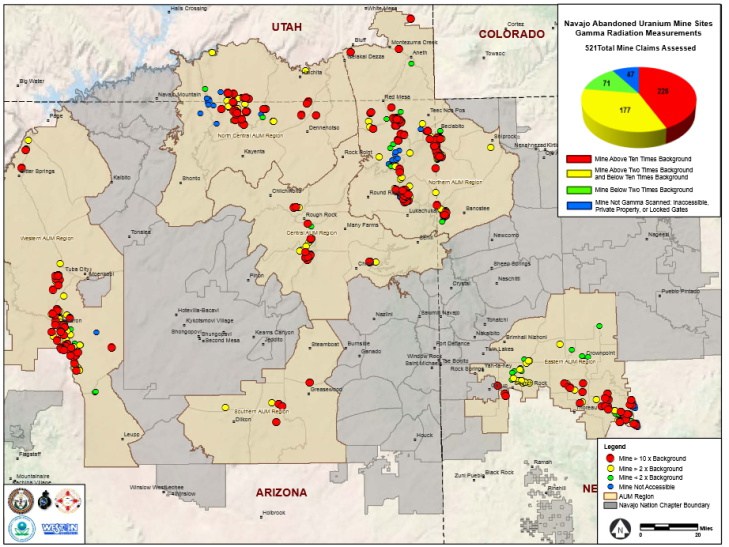
Navajo abandoned uranium mines gamma radiation measurements and priority mines. US EPA
The Los Angeles Times gave us a sense of the risk in 1986. Thomas Payne, an environmental health officer from Indian Health Services, accompanied by a National Park Service ranger, took water samples from 48 sites in Navajo territory. The group of samples showed uranium levels in wells as high as 139 picocuries per liter. Levels In abandoned pits were far more dangerous, sometimes exceeding 4,000 picocuries. The EPA limit for safe drinking water is 20 picocuries per liter.
This unresolved plague of radiation is compounded by pollution from coal mines and a coal-fired power plant that manifests at an even more systemic level; the entire Navajo water supply is currently tainted with industry toxins.
Recent media coverage and spiraling public outrage over the water crisis in Flint, Michigan has completely eclipsed the ongoing environmental justice struggles of the Navajo. Even worse, the media continues to frame the situation in Flint as some sort of isolated incident.
Madeline Stano, attorney for the Center on Race, Poverty & the Environment, assessed the situation for the San Diego Free Press, commenting, “Unfortunately, Flint’s water scandal is a symptom of a much larger disease. It’s far from an isolated incidence, in the history of Michigan itself and in the country writ large.”
Other instances of criminally negligent environmental pollution in the United States include the 50-year legacy of PCB contamination at the Mohawk community of Akwesasne, and the Hanford Nuclear Reservation (HNR) situated in the Yakama Nation’s “front yard.”
While many environmental movements are fighting to establish proper regulation of pollutants at state, federal, and even international levels, these four cases are representative of a pervasive, environmental racism that stacks up against communities like the Navajo and prevents them from receiving equal protection under existing regulations and policies.
Despite the common thread among these cases, the wave of righteous indignation over the ongoing tragedy in Flint has yet to reach the Navajo Nation, the Mohawk community of Akwesasne, the Yakama Nation – or the many other Indigenous communities across the United States that continue to endure various toxic legacies in relative silence.
Current public outcry may be a harbinger, however, of an environmental justice movement ready to galvanize itself towards a higher calling, one that includes all peoples across the United States, and truly shares the ongoing, collective environmental victories with all communities of color.
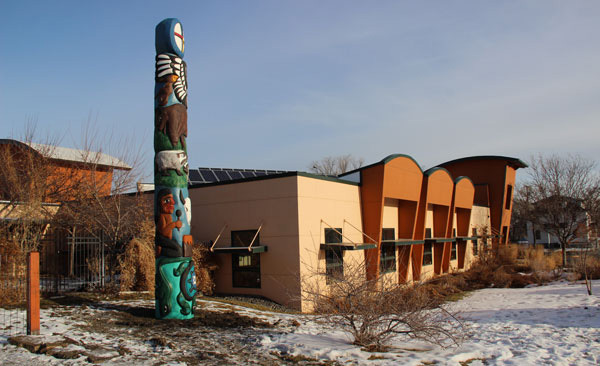
by Deep Green Resistance News Service | Jan 23, 2016 | Colonialism & Conquest
Featured image: The 22-foot western cedar totem pole, which features animals and symbols important to the Northern Cheyenne people was created by Master Carver and Lummi Elder Jewell James and the House of Tears carvers, of the Lummi Nation. The totem pole is a gift from the Lummi Nation to members of the Northern Cheyenne Tribe in southeast Montana as a symbol of solidarity between two tribes whose homelands are threatened by proposed coal export projects. A dedication ceremony for the totem pole was held on January 22, 2016, outside the Northern Plains Resource Council building in Billings, Montana, where the totem pole will stand until a more permanent home is found on the Northern Cheyenne Reservation. Photo courtesy of the Northern Plains Resource Council.
By Sandy Robson / Coal Stop
Author’s note: Today, one hundred and sixty-one years ago, the Treaty of Point Elliott was signed on January 22, 1855, by Isaac Stevens, then-Governor of Washington Territory, and by Duwamish Chief Seattle, Lummi Chief Chow-its-hoot, Snoqualmie Chief Patkanim, and other chiefs, subchiefs, and delegates of tribes, bands, and villages.

Elliott Treaty monument in Mukilteo, WA
In my endeavor to honor today’s 161st anniversary of the signing of the Treaty of Point Elliott, this piece brings attention to the disturbing fact that, presently, certain members of Congress are dishonoring that very same treaty as they seek to undermine it.
Treaty rights of the Lummi people are secured to them by the U.S. federal government in the Treaty of Point Elliott. Specific to treaty fishing rights, is Article 5 of the Treaty provides that, “The right of taking fish from usual and accustomed grounds and stations is further secured to said Indians in common with all citizens of the Territory. . .”
In determining whether Lummi Nation’s treaty-guaranteed rights of access to its usual and accustomed fishing grounds and stations, and harvest of fish, would be adversely impacted by the Gateway Pacific Terminal (GPT) project, a 48 million metric ton per year coal export terminal, the U.S. Army Corps of Engineers (“the Corps”) will be applying a de minimis threshold standard. Any impacts considered to be greater than de minimis by the Corps would warrant the GPT permit denial that Lummi Nation requested of the Corps back over a year ago, on January, 5, 2015.
Underneath the brief summary below of the legislative efforts of several members of Congress, is a detailed outline of the politicians; the campaign money, totaling over a quarter million dollars those politicians have received thus far; and the companies and projects, all relating to legislation that would diminish and undermine tribal treaty rights pertaining to proposed coal export projects in Washington state.
The Story
Congressional legislators who are backed by the coal industry and coal export terminal interests, have tried multiple times to attach a rider onto various bills that would undermine tribal treaty rights relating to the proposed Pacific Northwest coal export terminals. The original amendments proposed were specifically designed to try to prohibit the U.S. Army Corps of Engineers (“the Corps”) from making its determination regarding the Lummi Nation’s treaty fishing rights relating to the proposed Gateway Pacific Terminal at Xwe’chi’eXen (Cherry Point), before the final Environmental Impact Statement (EIS) would be completed for the project.
The language crafted in an amendment presently proposed by federal legislators, could adversely impact the treaty rights of all Indian Tribes and Indian Nations pertaining to projects such as GPT, or the Millennium Bulk Terminal, a 44 million metric ton per year coal export terminal proposed in Longview, Washington, both of which are presently under environmental review.
The fact that the Corps “owes the highest fiduciary duty to protect Indian contract rights as embodied by treaties” is entrenched in case law. That solemn duty and obligation owed to the Lummi Nation by the U.S. federal government, in this case by the Corps in relation to the GPT project, is something the agency addresses separately from any EIS it is tasked with on proposed projects.
In December, 2015, those multiple attempts to attach a rider which would undermine the Lummi Nation’s exercising of its treaty rights relating to the proposed Gateway Pacific Terminal (GPT) project, proved successful when Congressman David McKinley (R-W.Va.), and Congressman Ryan Zinke (R-MT), proposed Amendment 13, the “McKinley Amendment.” The amendment is attached to H.R. 8, the “North American Energy Security and Infrastructure Act of 2015.”
The “McKinley Amendment,” now designated Amendment 850, had originally been designated as Amendment 13 in the House. Amendment 13 was passed by the House on December 2, 2015, and then H.R. 8 was passed by the House the next day, on December 3, 2015.
Amendment 850, the “McKinley Amendment,” seeks to prohibit the denial of a permit for the construction, operation, or maintenance of an export facility until all reviews required under NEPA are complete.
 On December 7, 2015, H.R. 8 was received in the Senate and referred to the Committee on Energy and Natural Resources. The next step for H.R. 8 will be a hearing in the Senate.
On December 7, 2015, H.R. 8 was received in the Senate and referred to the Committee on Energy and Natural Resources. The next step for H.R. 8 will be a hearing in the Senate.
People should contact their U.S. senators to voice their opposition to Amendment 850, the “McKinley Amendment,” that is attached to H.R. 8.
Every day that passes as the Corps is making its decision on the fate of the GPT permit, is another opportunity for coal-backed legislators such as Congressmen McKinley and Zinke, and Senator Daines, to craft legislation aimed at diminishing Lummi Nation’s, and other tribes’ treaty rights.
Honor The Treaty. Now.
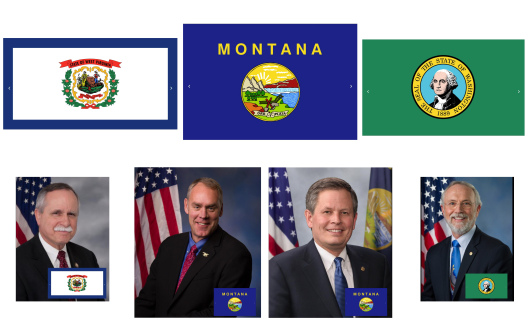
Top row, left to right: state flags of West Virginia, Montana, and Washington State. Bottom row, left to right: Congressman David McKinley (R-W.Va.), Congressman Ryan Zinke (R-MT), U.S. Senator Steve Daines (R-MT), Congressman Dan Newhouse (R-WA).
The Politicians
Congressman Ryan Zinke (R-MT) — Ryan Zinke, along with U.S. Senator Steve Daines, led a group of sixteen senators and seventeen members of the House in sending two July 28, 2015 letters (one from the Senate and one from the House) to the U.S. Army Corps of Engineers. The letters urged U.S. Assistant Secretary of the Army Jo-Ellen Darcy, to complete the environmental review process for the proposed GPT project prior to the Corps making a determination whether impacts to any tribes’ U&A (usual and accustomed) treaty fishing rights are more than de minimis, or too small or trivial to warrant legal review.
U.S. Senator Steve Daines (R-MT) — Senator Daines attempted multiple times, during the summer of 2015, to attach a specifically crafted amendment to various pieces of unrelated legislation. The amendments were specifically designed to try to prohibit the Corps from making its determination regarding the Lummi Nation’s treaty fishing rights relating to the proposed GPT, before the final Environmental Impact Statement (EIS) would be completed for the project. Daines ended up withdrawing his amendment. It is important to note that while Senator Daines orchestrates such efforts against the treaty rights of the Lummi Nation, he is a member of the Senate Committee on Indian Affairs.
Senator Daines, along with Congressman Zinke, led the group of sixteen senators and seventeen members of the House in sending the two July 28, 2015 letters mentioned above, to the U.S. Army Corps of Engineers.
Congressman David McKinley (R-W.Va.)— McKinley proposed Amendment 13 (now designated Amendment 850), the McKinley Amendment, which the House passed by a voice vote on December 2, 2015. Congressman Zinke co-sponsored that amendment.
Congressman Dan Newhouse (R-WA) – Dan Newhouse’s office was contacted about his position on Amendment 13 (now called Amendment 850) that was passed by the House on December 2, 2015, by a voice vote. Congressman Newhouse’s office staff responded “he supports that amendment, he supported it in the Rules Committee, and worked with McKinley and Daines on that.” Apparently, once again, Senator Daines has been involved in an attempt to undermine the treaty rights of the Lummi Nation, as he worked with Congressman McKinley on Amendment 850.
The Money
Congressman David McKinley (R-W.Va.), so far, has received the following campaign contributions relating to the proposed coal export terminals:
–$1,000 from FRS Capital for 2015-2016
–$3,500 from Arch Coal for 2015-2016
–$2,000 National Mining Association for 2015-2016
–$10,750 from Arch Coal for 2013-2014
–$5,000 from National Mining Association for 2013-2014
–$33,500 from Arch Coal for 2011-2012
–$10,000 from National Mining Association for 2011-2012
–$2,400 from Boich Companies for 2012 election cycle
Congressman Ryan Zinke (R-MT), so far, has received the following campaign contribution for the 2015-2016 election cycle relating to the proposed coal export terminals:
–$6,000 from FRS Capital Corp (ultimate parent company over Carrix and SSA Marine) for 2015-2016 election cycle
–$4,500 from Cloud Peak Energy (has 49% stake in PIT/GPT) for 2015-2016 election cycle
–$4,000 from Arch Coal for 2015-2016 election cycle
–$3,000 from National Mining Association for the 2015-2016 election cycle
–$17,700 from BNSF/Berkshire Hathaway for 2013-2016
Senator Steve Daines (R-MT), so far, has received the following campaign contributions relating to the proposed coal export terminals:
–$2,500 from FRS Capital Corp for the 2015-2016 election cycle
–$32,500 from Berkshire Hathaway for 2013-2016
–$26,400 from Boich Companies for 2013-2016
–$16,000 from Cloud Peak Energy for 2015-2016
–$11,500 from Arch Coal for 2013-2016
–$17,500 from National Mining Association for 2013-2016
Congressman Dan Newhouse (R-WA), so far, has received the following campaign contributions relating to the proposed coal export terminals:
–$6,000 from FRS Capital Corp (ultimate parent company over Carrix and SSA Marine) for the 2014 election cycle
–$2,500 from FRS Capital Corp/SSA Marine for the 2015-2016 election cycle
–$6,000 from Berkshire Hathaway (parent company over BNSF which would transport coal from WY and MT to the proposed Pac NW coal export terminals) for 2015-2016 election cycle
–$3,000 from Arch Coal for 2015-2016 election cycle
–$1,000 from National Mining Association for 2015-2016 election cycle
All of the campaign contributions listed above were obtained from the website, OpenSecrets.org.
The Companies and Proposed Projects
Gateway Pacific Terminal (GPT) — a proposed 48 million ton per coal export terminal at Cherry Point, in Whatcom County, Washington
Pacific International Terminals (PIT) — a subsidiary of SSA Marine and the applicant for the GPT project
SSA Marine — parent company over PIT
FRS Capital Corp — parent company over Carrix. Carrix is the parent company over SSA Marine
Cloud Peak Energy — presently has a 49% interest in PIT/GPT, and has an agreement with SSA Marine for an option to ship up to 17.6 million short tons of capacity per year through GPT
Arch Coal — in January, 2011, Arch Coal acquired a 38% equity interest in Millennium Bulk Terminals-Longview, LLC and its proposed Millennium Bulk Logistics Terminal. Arch Coal filed for Chapter 11 bankruptcy on January 11, 2016. Since Arch Coal filed for Chapter 11 bankruptcy, the stock has lost more than 80% of its value, and effective January 12, 2016, trading in Arch Coal common stock was suspended on the New York Stock Exchange
Millennium Bulk Terminals-Longview Coal Export Terminal — a proposed coal export terminal project to redevelop an operating bulk materials port on the Columbia River in Longview, Washington, for the export of 44 million metric tons of coal annually. The terminal is served by BNSF and Union Pacific railroads
Millennium Bulk Terminals-Longview, LLC (formerly Millennium Bulk Logistics) — a subsidiary of Australia-based Ambre Energy that was a majority (62%) partner in the Millennium Bulk Logistics Longview Terminal project (Arch Coal has a 38% interest). In November 2014, Ambre Energy sold its two Rocky Mountain coal mines and its stake in proposed coal export terminals planned for Washington and Oregon to Resource Capital Funds (a Denver, Colorado private equity firm) for $18 million, according to company filings with Australian regulators
Resource Capital Funds (RCF) is a long-established investor in Ambre Energy, maintaining a voting position on the company’s board, and loaning Ambre approximately $95 million. RCF bought the Decker mine in Montana, and the Black Butte mine in Wyoming, along with Ambre’s stake in the Morrow Pacific Project in Oregon and its stake in Millennium Bulk Logistics Longview Terminal in Washington
Ambre Energy had purchased Cloud Peak Energy’s 50% interest in Decker mine and related assets in September of 2014, and assumed 100% ownership of Decker Mine. Part of that deal included an option granted to Cloud Peak Energy for up to 7 million metric tonnes per year of throughput capacity at the proposed Millennium Bulk Logistics Longview Terminal, and Ambre Energy’s assumption of all reclamation and other Decker liabilities and replacement of Cloud Peak Energy’s $66.7 million in outstanding reclamation and lease bonds
Under the deal between RCF and Ambre Energy, RCF would operate under the name Ambre Energy North America, and the leadership team would stay the same. In April 2015, Ambre Energy North America changed its name to Lighthouse Resources Inc. Lighthouse Resources is a privately held company headquartered in Salt Lake City, Utah
BNSF Railway — applicant for the interrelated (to GPT) Custer Spur rail project and company that would transport coal from WY and MT to the proposed GPT and Millennium Bulk coal export terminals
Berkshire Hathaway — parent company over BNSF
Boich Companies — Boich Companies is a privately held coal mining and marketing company headquartered in Ohio, and is a joint-owner of Signal Peak Energy, LLC (Signal Peak Coal Mine) in Montana. Signal Peak Energy is jointly-owned by Boich Companies, FirstEnergy Corp., an Ohio-based utility company, and Pinesdale LLC, a wholly-owned subsidiary of Swiss commodity trader Gunvor Group, Ltd. The three partner companies formed an entity, Global Mining Holding Company LLC, to hold all the ownership interests. Global Mining Holding Company’s owners are FirstEnergy Ventures, a subsidiary of FirstEnergy; WMB Marketing, a Boich subsidiary; and Gunvor Group
Signal Peak Energy is a major exporter of coal, primarily to Asia, so it’s likely that Boich Companies is interested in getting a contract for shipping/exporting its Signal Peak coal to Asia through GPT in Whatcom County, WA. It is currently shipping coal through Westport Terminal in British Columbia. Signal Peak Energy is jointly-owned by Boich Companies, FirstEnergy Ventures (Ohio-based utility company), and Pinesdale LLC, a wholly-owned subsidiary of Swiss commodity trader Gunvor Group, Ltd.
Boich Companies is part owner Global Coal Sales Group which acquires coal mined at its affiliate Signal Peak Energy’s mine, from FirstEnergy Generation (a subsidiary of FirstEnergy Corp), and sells the coal in the international market. Global Coal Sales Group LLC, contributed $50,000 to the coal interest-funded Political Action Committee SaveWhatcom, during the 2013 Whatcom County election
National Mining Association (NMA) — is the national trade organization of the U.S. mining industry representing mining interests before Congress, the Administration, federal agencies, the judiciary, media, and the public. NMA also has at least two Political Action Committees.
Cloud Peak Energy, BNSF Railway, Peabody Energy, Millennium Bulk Terminals, Arch Coal, and Lighthouse Resources are listed members of the National Mining Association
Goldman Sachs — it was announced on July 5, 2007, that Goldman Sachs Infrastructure Partners committed to equity investment in Carrix (parent company over SSA Marine), giving Goldman Sachs Infrastructure Partners a 49% interest in Carrix). This funding was integral to the Gateway Pacific Terminal project. In January 2014, Goldman Sachs pulled out of the GPT project, selling its 49% interest back to SSA Marine.

by Deep Green Resistance News Service | Jan 12, 2016 | Colonialism & Conquest, Indigenous Autonomy
Featured image: September 21, 2012: Members of the Lummi Nation protest the proposed coal export terminal at Cherry Point by burning a large check stamped “Non-Negotiable.” The tribe says they want to protect the natural and cultural heritage of the site. Photo by Indian Country Today Media Network.
By Sandy Robson / Coal Stop
The Lynden Tribune newspaper made the decision to publish a December 23, 2015 opinion piece submitted by Chair John Huntley and President Brad Owens of the Northwest Jobs Alliance (NWJA). The NWJA advocates for the proposed Gateway Pacific Terminal (GPT) project. Their op-ed leveled unsubstantiated, defamatory allegations at unnamed “leadership” of the Lummi Nation, a self-governing Indian Nation, and those allegations could easily be perceived as having been leveled at Lummi Nation as a whole.

Canoe and murals in the Lummi Administrative Building
The Lummi, a Coast Salish people, are the original inhabitants of Washington state’s northernmost coast and southern British Columbia. The Lummi Reservation is located in western Whatcom County, and it is governed by the Lummi Indian Business Council (LIBC), an eleven member tribal council.
 NWJA’s December 23, 2015 Lynden Tribune op-ed claimed that “the current leadership of the Lummi Nation has embarked upon a campaign against the working families of Whatcom County.” In an attempt to support that inflammatory claim, NWJA pointed to a December 10, 2015 letter from Kirk Vinish of the Lummi Nation’s Planning Department. However, a review of that 2-page letter produced no evidence to support such a claim.
NWJA’s December 23, 2015 Lynden Tribune op-ed claimed that “the current leadership of the Lummi Nation has embarked upon a campaign against the working families of Whatcom County.” In an attempt to support that inflammatory claim, NWJA pointed to a December 10, 2015 letter from Kirk Vinish of the Lummi Nation’s Planning Department. However, a review of that 2-page letter produced no evidence to support such a claim.
In contrast, NWJA has left a trail of evidence demonstrating its continued pattern of negative messaging to raise resentment about, and discredit, the Lummi Nation’s opposition to GPT by sending accusatory letters to the Army Corps and Whatcom County, and by disseminating similar accusatory messaging to the public, via the NWJA email list and a press release sent to local media.
In NWJA’s opinion piece, Huntley and Owens also alleged that Lummi Nation leaders are proposing the elimination of existing Cherry Point industry jobs. They provided no evidence whatsoever to support such a claim.
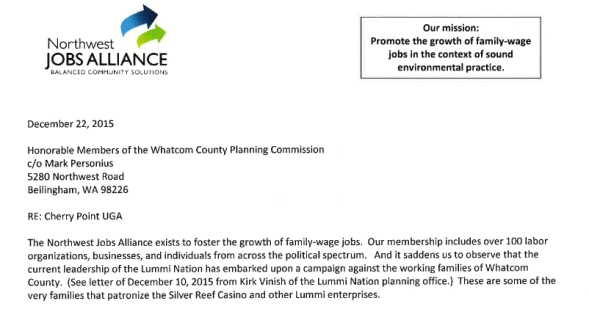
Excerpt from NWJA’s December 22 comment letter to the Whatcom County Planning Commission
As if it weren’t bad enough that NWJA submitted its defamatory op-ed for publication in a local newspaper, the Alliance launched a second strike aimed at Lummi Nation leadership the day before, by submitting a December 22 comment letter to the Whatcom County Planning Commission, on the currently ongoing Whatcom County Comprehensive Plan Update.
The comment letter was a slightly revised version of NWJA’s op-ed published in the Lynden Tribune, containing the same unsubstantiated accusations. NWJA’s inflammatory comment letter is now part of the official public comment record for the County Comprehensive Plan Update which the Whatcom County Council will review prior to voting on the final language to be included in the plan update. The fact that the Council is also one of the decision makers on permits needed by PIT for its GPT project makes NWJA’s comment letter “comprehensively” reprehensible.
GPT threatens Lummi treaty rights
GPT would be sited along the Salish Sea shoreline, at Xwe’chi’eXen, part of the Lummi Nation’s traditional fishing area. Xwe’chi’eXen is the Lummi peoples’ ancestral name for Cherry Point, an area which has a deep cultural, historic and spiritual significance to the Lummi people, as it was a village site for their ancestors for over 175 generations.
The projected coal export terminal threatens Lummi treaty rights, the salmon they depend on, their Schelangen (“Way of Life”), and the cultural integrity of Xwe’chi’eXen. LIBC Chairman Tim Ballew II sent a January 5, 2015 letter to the U.S. Army Corps of Engineers Seattle District Commander, Colonel John G. Buck, asking the agency to take immediate action to deny the GPT permit application.
In that letter, Chairman Ballew stated that the GPT project “will directly result in a substantial impairment of the treaty rights of the Lummi Nation throughout the Nation’s ‘usual and accustomed’ fishing areas.” Ballew also wrote that “The Lummi Nation is opposed to this project due to the cultural and spiritual significance of Xwe’chi’eXen, and intends to use all means necessary to protect it.” He added that the Lummi Nation has a sacred obligation to protect Xwe’chi’eXen based on that significance.

Page excerpt from “Protecting Treaty Rights, Sacred Places, and Lifeways: Coal vs. Communites,” presented by Jewell James, Lummi Tribal Member and Head Carver, Lummi Tribe’s House of Tears Carvers
The U.S. Army Corps of Engineers (“the Corps”) is the federal agency tasked with coordinating and handling the environmental review for the GPT project, and it is legally obligated to ensure that the Lummi Nation’s treaty rights are protected, and are not violated. Currently, the Corps is in the process of making a determination as to whether impacts to any tribes’ U&A (usual and accustomed) treaty fishing rights are more than de minimis, meaning too small or trivial to warrant legal review.

Article VI of the U.S. Constitution which includes the clause that establishes treaties made under its authority, are the supreme law of the land
SSA Marine consultant Craig Cole, Director for NWJA
The Northwest Jobs Alliance (NWJA) was created to promote and advocate for the GPT project. For the first few years, NWJA consisted solely of a Facebook page, after that page had been created in May of 2011. NWJA’s original mission statement that had been displayed for years on its Facebook page read: “The Alliance focuses their efforts on supporting the Gateway Pacific Terminal. . .” For almost three years, NWJA’s Facebook page showed “www.gatewaypacificterminal.com” as its website address, and the phone number displayed had been a non-working number.
Several articles appeared in Whatcom County citizen-based publications during the summer and fall of 2014, criticizing the legitimacy of the NWJA and likening it to a front group, as it did not have a working phone number or a website other than the official GPT website. Subsequently, NWJA made some changes. In fall of 2014, the NWJA added a working phone number, created a website for its online presence, and changed its listed website address on its Facebook page from “gatewaypacificterminal.com” to “NWJA.org.”
Presently, the NWJA website states the following as its mission: “The Northwest Jobs Alliance (NWJA) promotes the growth of family-wage jobs in the context of sound environmental practice.” Also, there is no mention of GPT on the NWJA website’s Home page where the organization’s mission and focus are explained. Instead the general term “Cherry Point industrial area” is used.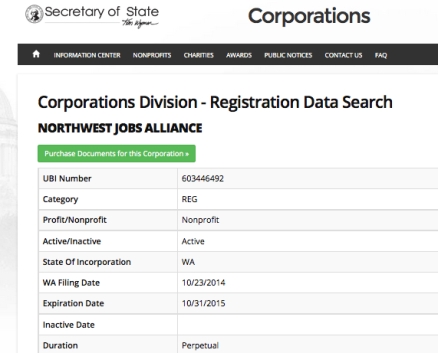 On October 23, 2014, NWJA was filed as a non-profit corporation, according to the Washington Secretary of State website. SSA Marine’s paid local consultant for the GPT project, Bellingham resident Craig Cole, is the listed Director for NWJA.
On October 23, 2014, NWJA was filed as a non-profit corporation, according to the Washington Secretary of State website. SSA Marine’s paid local consultant for the GPT project, Bellingham resident Craig Cole, is the listed Director for NWJA.
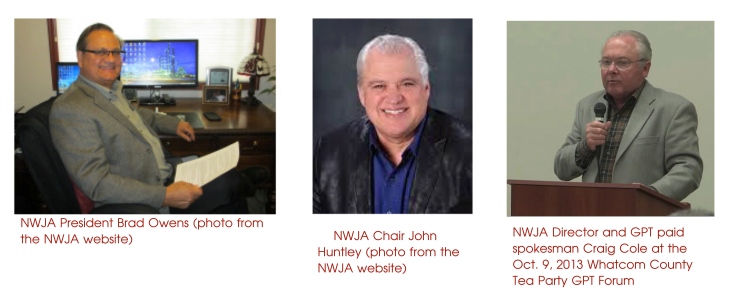 Since its inception, NWJA has had a steady turnover of co-chairs, all of whom have been very public advocates for the GPT project. Presently, Brad Owens is listed as NWJA President and John Huntley is listed as NWJA Chair. Huntley owns Mills Electric, a Bellingham electrical contracting company. Owens, a Bellingham resident, is the past President of the NW Washington Building & Construction Trades Council.
Since its inception, NWJA has had a steady turnover of co-chairs, all of whom have been very public advocates for the GPT project. Presently, Brad Owens is listed as NWJA President and John Huntley is listed as NWJA Chair. Huntley owns Mills Electric, a Bellingham electrical contracting company. Owens, a Bellingham resident, is the past President of the NW Washington Building & Construction Trades Council.
Some people confuse the “Northwest Jobs Alliance” for another similarly titled GPT advocacy organization called the “Alliance for Northwest Jobs and Exports.” It’s worthwhile to distinguish between the two, although promoting the GPT project has been the central intended purpose of both groups.
Cloud Peak Energy and BNSF govern Alliance for NW Jobs & Exports
The Alliance for Northwest Jobs and Exports (ANWJE) was first presented to the public as a grass-roots organization, when it was actually created in 2012, by Edelman, the world’s largest public relations firm, which was hired by SSA Marine to do public relations work for the proposed GPT project.
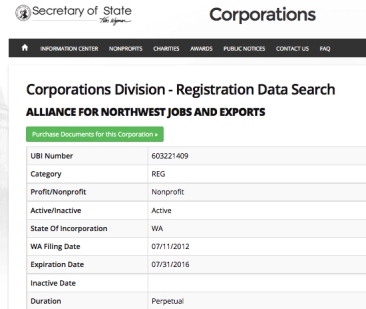 According to the Washington Secretary of State website, ANWJE was filed as a non-profit corporationin July 2012. The “Governing Persons” listed are Todd O’Hair and Zak Andersen. Todd O’Hair is currently Senior Manager, Government Affairs for Cloud Peak Energy Inc. which has a 49% stake in SSA Marine/PIT’s GPT project. Zak Andersen is presently Assistant Vice President, Community and Public Affairs for BNSF Railway.
According to the Washington Secretary of State website, ANWJE was filed as a non-profit corporationin July 2012. The “Governing Persons” listed are Todd O’Hair and Zak Andersen. Todd O’Hair is currently Senior Manager, Government Affairs for Cloud Peak Energy Inc. which has a 49% stake in SSA Marine/PIT’s GPT project. Zak Andersen is presently Assistant Vice President, Community and Public Affairs for BNSF Railway. 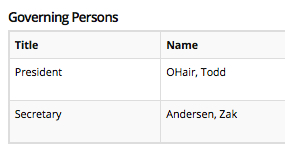 BNSF is the applicant for GPT’s interrelated Custer Spur project and would be the railway transporting coal mined in Montana and Wyoming to GPT. ANWJE’s website describes its group as a “non-profit trade organization that supports new export projects in Oregon and Washington State…”
BNSF is the applicant for GPT’s interrelated Custer Spur project and would be the railway transporting coal mined in Montana and Wyoming to GPT. ANWJE’s website describes its group as a “non-profit trade organization that supports new export projects in Oregon and Washington State…”
BNSF Railway, SSA Marine, and Cloud Peak Energy are listed on the ANWJE’s membership list, which is comprised of companies and other entities which stand to benefit financially from the coal export terminal. So, this “non-profit trade organization” was created by the public relations firm hired by the GPT applicant, and it is governed by an employee of BNSF, the applicant for the interrelated Custer Spur project, and by an employee of Cloud Peak Energy, which has a 49% stake in SSA Marine/PIT’s GPT project.
NWJA’s attempt to drive public opinion against Lummi opposition to GPT
Whatcom Tea Party board member Kris Halterman hosts a local Whatcom County KGMI talk radio show, “Saturday Morning Live” (SML). On her September 12, 2015 SML show, Halterman hosted NWJA President Brad Owens, and together, they advanced an unsubstantiated, defamatory assertion that NWJA (the entity behind the Lynden Tribune op-ed) had previously purported in its August 20, 2015 letter to the Corps—that there is “an apparent motive behind the Lummi Nation’s opposition to the Gateway Pacific Terminal project (and completion of the EIS process)not connected with treaty rights.” [italicized emphasis theirs]
Joining in those activities against Lummi opposition to GPT, was the Political Action Committee SAVEWhatcom, headed up by Halterman, whose name pops up in most everything GPT-related. The SAVEWhatcom PAC was the vehicle for Gateway Pacific coal terminal interests to fund 2013 and 2014 local Whatcom County election political campaigns with over $160,000, which, if successful, would benefit those interests.
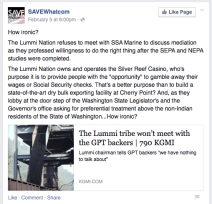
February 5, 2015 post from the SAVEWhatcom Facebook page
One month after the LIBC’s January 5, 2015 letter to the Corps, Halterman’s SAVEWhatcom placed a February 5 post on its Facebook page which disparaged the Lummi Nation and its Silver Reef Casino in what appeared to be an attempt to drive public opinion against the Lummi Nation’s strong oppositional stance to GPT.
Then, in an August 12, 2015 comment letter to the Whatcom County Planning Commission, NWJA seemed to pit “working families” who were characterized in the letter as “some of the very people who patronize Lummi enterprises”— against what was described as “tribal aspirations.” Echoing that previous tack of drawing attention to the Lummi Nation’s enterprises while at the same time denigrating the Nation with groundless claims, the NWJA referenced the Lummi Nation’s Silver Reef Casino in their December 23, 2015 Lynden Tribune op-ed. That excerpt read:
“And it saddens us to observe that the current leadership of the Lummi Nation has embarked upon a campaign against the working families of Whatcom County. These are some of the very families that patronize the Silver Reef Casino and other Lummi enterprises. Some thanks.”
Those specific repeated references to the Lummi Nation’s Silver Reef Casino and enterprises by SAVEWhatcom and the SSA Marine consultant-led NWJA, could be viewed as attempts to drive public opinion against the Lummi Nation’s Silver Reef enterprises—trying to change the minds of the Silver Reef’s loyal patrons who enjoy the hotel, spa, casino, entertainment/shows, multiple restaurants, convention and event venue, and more.
NWJA omits important statistics
NWJA’s December 23 opinion piece failed to mention that the Lummi Nation’s Silver Reef Hotel Casino & Spa employs 675 people. It also failed to mention any of the significant contributions from the Lummi Nation to Whatcom County’s community at large, which certainly have a positive impact on countless families and individuals in Whatcom County. For example, LIBC Chairman Tim Ballew stated in a May 2015 piece in The Bellingham Herald, that Lummi Nation was “humbled and honored to be able to give back to the people who work so hard to make our community thrive,” when referring to its Nation’s donations of over $600,000 awarded to 43 organizations. Some of those organizations include the Bellingham Food Bank, the Whatcom Literacy Council, and Whatcom County Fire District 8, to name a few.
NWJA stated in its December 23 op-ed and its December 22 comment letter to the County Planning Commission, that “Whatcom County ranks 30th out of 39 counties for personal income growth [Bellingham Herald 11/19/15].” In reading The Bellingham Herald article cited as a source for that statistic, NWJA did not bother to inform readers that while the per capita personal income average in Whatcom County increased 3.2% from 2013 to 2014, placing it 30th out of 39 counties in the state, Whatcom County’s 2014 per capita income total ranks 16th highest out of Washington’s 39 counties.
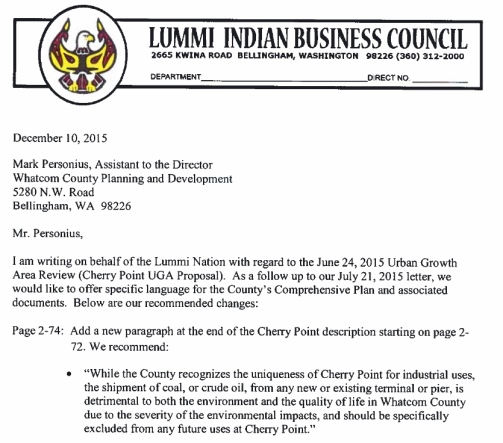
Excerpt from December 10, 2015 comment letter submitted to Whatcom County Planning and Development by the Lummi Nation Planning Department
In its December 23 op-ed, and in its December 22 comment letter NWJA sent to the Planning Commission, Huntley and Owens referenced specific language from the December 10, 2015 comment letter from Lummi Nation’s Planning Department submitted to Whatcom County Planning and Development. The specific language was a new policy that Lummi Nation recommended be added to the County Comprehensive Plan:
“The shipment of coal, or crude oil, from any new shipping terminal or pier, or any existing terminal or pier, is prohibited.” Huntley and Owens said they were troubled by the Lummi Nation’s recommendation and wrote:
“This echoes previous requests that the Lummi have made to the County to begin phasing out the Cherry Point heavy industrial zone.” No evidence, however, was provided by the NWJA to show any previous, or even current, requests from Lummi Nation to begin phasing out the Cherry Point heavy industrial zone.
The underbelly of their reasoning
One particular statement NWJA made in its August 12, 2015 comment letter to the County Planning Commission revealed the underbelly of their reasoning:
“The Lummi occupy an important and unique role in our community, but they are just 1.5% of the County’s population.”
NWJA repeated similar statements in its August 27, 2015 email advertisement disseminated via its mailing list, and in its September 10, 2015 press release, potentially indicating to their audiences a reason to marginalize and dismiss Lummi Nation’s voice based on the Lummi’s minority population status.
Just as “Manifest Destiny” mandated that it was supposedly God’s providence that the U.S. should exercise hegemony over its neighbors—seeing North America as the new Promised Land, NWJA and the GPT corporate interests they advocate for, seem to believe that it’s their economic providence to exercise hegemony over the Lummi Nation—seeing Xwe’chi’eXen (Cherry Point) and its naturally occurring deep-water contours which allow for huge Capesize vessels stuffed with U.S. coal bound for Asia, as their new Promised Land.
The Lummi Nation, however, and countless people in the Pacific Northwest region, have a very different view of their destiny, and that view does not include the transporting, handling, and shipping of 48 million metric tons per year of coal to Asia, which is the plan for GPT.
Raising resentment of tribal treaty rights; encouraging the public and government officials to ignore tribal treaty rights; calling into question the motivation behind an Indian Nation’s exercising of its tribal treaty rights; interfering with the federal regulatory review process and the government to government relationship between a U.S. federal agency and Indian Tribes and Indian Nations; and making disparaging and unsubstantiated accusations against an Indian Nation and its leaders, are some of the various ways in which the Lummi Nation is being attacked as powerful corporations endeavor to realize their perceived manifest destinies, in pursuit of a coal export terminal at Xwe’chi’eXen.




















